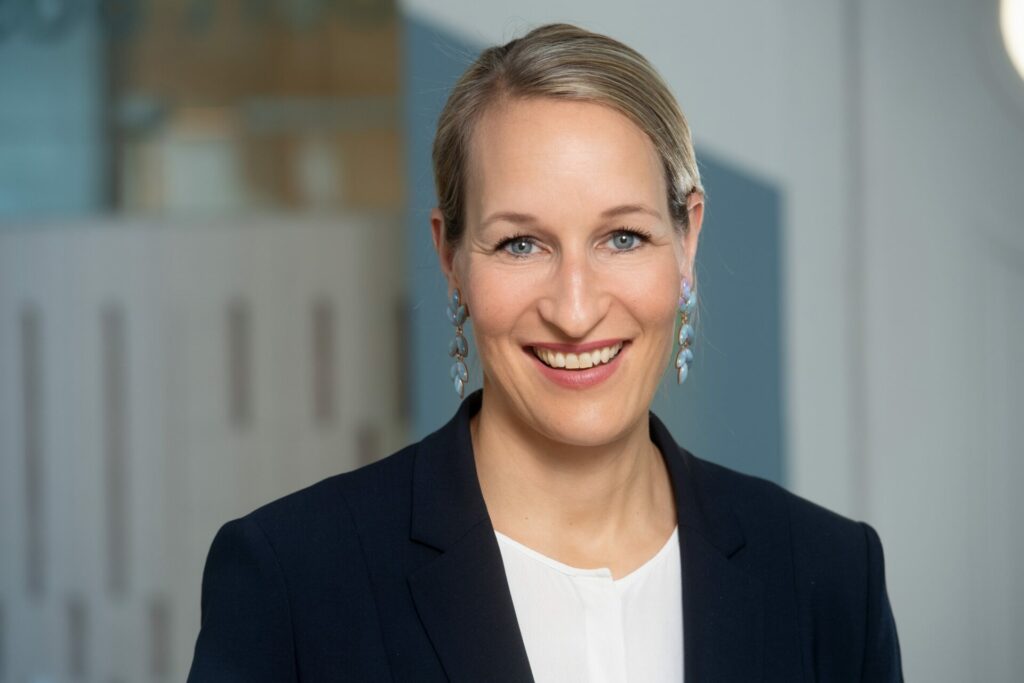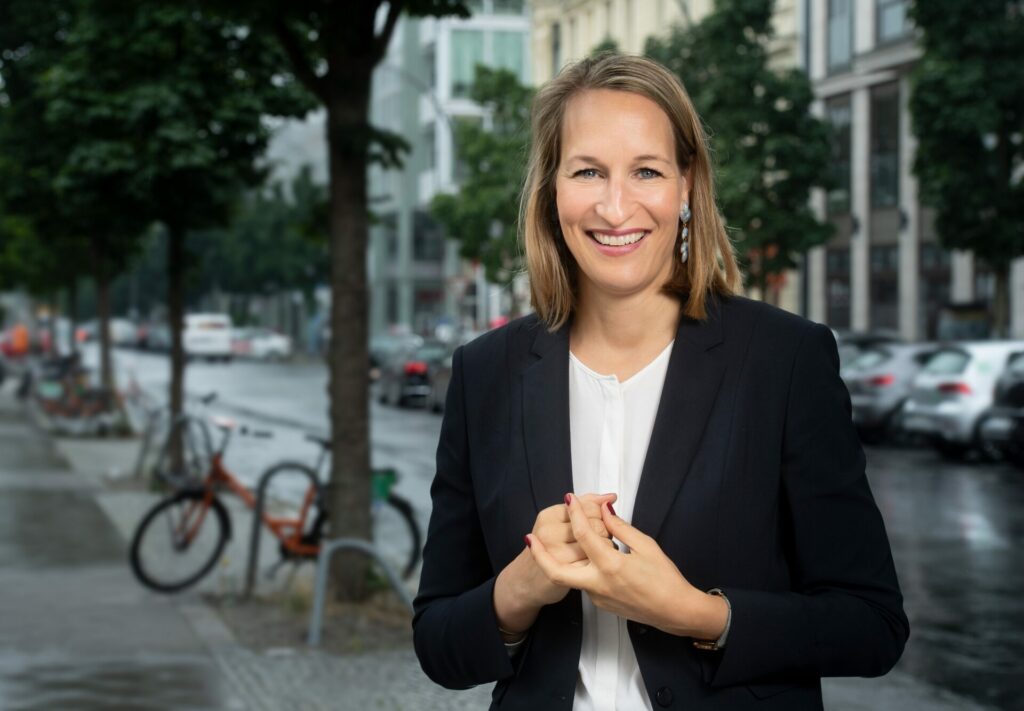“I want to see an inclusive society in which foundations play a strong role”
by Dr. Hanna Stähle and Karalyn Gardner
In September 2020, Kirsten Hommelhoff, a trained lawyer with over 10 years of management experience at the Mercator Foundation, took over as Secretary General and the first female leader of the Association of German Foundations, one of the oldest and largest philanthropy support organisations in the world. This month, we sat down to get to know her and her personal story. She shared her hopes for the German foundation sector, her thoughts on female leadership and her desire for a European single market for philanthropy.
Today marks almost exactly three months since you started as Secretary General of the Association of German Foundations. Have you faced anything unexpected?
The whole corona situation is unexpected. At least, when I started, things weren’t as challenging as they are now. This gave me the chance to see and speak to my team and some of our members in person. Leadership in corona times is absolutely demanding, especially if you do not yet know your team that well.
At the Dafne CEO retreat, we talked about our personal life stories and values. What shaped you, your values and purpose?
When I think about my life, I often had to adapt to new situations. I have moved very often so I am used to adapting to new people, new cities, new countries, new cultures. This can be challenging although, in the end, it is a very positive learning experience. This has made me a very open-minded person.
Besides, I grew up in a family where discussing politics was part of the daily family life. Every evening, we watched the news together. And, therefore, discussions of political and societal matters belonged to my daily routine. Also, having worked in all three sectors has shaped who I am, which is very helpful for my current work.
How did you come to move around so much?
I moved with my parents. I then studied in different cities, Wurzburg and Munich, and did an Erasmus year in Bologna. My legal education took me to Hamburg, Milan and Seoul and I did a Master’s in European Law in England. Changing cities and places was not always planned “strategically” I took whatever chances I had to see new places and countries.

Where was the most exciting place that you have worked and lived?
The most exciting was Korea in terms of cultural differences. If you have the chance to live in different countries and places, after a while, you get so adapted to being cosmopolitan and nothing really feels new. I enjoyed the feeling when I arrived in Korea that for the first time in many, many years, I did not understand anything. I could not read the signs, the food was different, the culture was different. My favourite part was daily life in Seoul. Italy on the other hand is my heart place. I have returned there over and over again.
I enjoyed the feeling when I arrived in Korea that for the first time in many, many years, I did not understand anything. I could not read the signs, the food was different, the culture was different.
How does it feel to be at the helm of the largest national association of foundations in the world? What excites you about your new role?
It is completely different to working in a foundation, even though I now represent many, many foundations. Here, there is greater variety than in a single foundation. This diversity in the membership, in terms of topics and activities, is overwhelming. You have to broaden your mind – smaller foundations have utterly different challenges than bigger ones, and they all have different expectations. This is the most exciting part: the possibility of representing such a variety of foundations, of themes.

What is the value of such philanthropy infrastructure?
I think it can really help, for instance, to advocate. There are things that all foundations want – a favourable legal framework, presence on a national level and some on a European and international level, good services, strong networks. It is very enriching if you see the possibility of matching foundations with shared goals and interests. However, all foundations handle these topics differently so there is a big need for cooperation. We have seen with COVID-19 that the need for cooperation is becoming more important. The possibility of learning from each other is something special an association can offer through its infrastructure.
This is a very exciting time. In Brussels, Roberta Bosurgi joined EVPA, as its first female CEO, and Delphine Moralis is the first female CEO of EFC. In the 72-year history of the Association of German Foundations, you are the first female leader. Also, Friederike von Bünau has been elected as the first chairwoman of its board. What is your take on this?
It is interesting, many people have asked me this. When we sent out the first press release, it said for the first time in over seventy years, there is a woman leading the association. At first, I thought: can this be the news? But I think, unfortunately, it is. I would like to live to see a time when female leaders don’t need to explain their presence anymore as an indicator of change, that this is just a natural thing. I think that there are typically female leadership qualities, just as there are typically male leadership qualities. I would say strong communication, listening and moderation are typically female qualities. I have always been a big fan of mixed teams. Diversity in terms of gender, age, background but also views and qualifications is definitely needed in high-performing teams.
When we sent out the first press release, it said for the first time in over seventy years, there is a woman leading the association. At first, I thought: can this be the news? But I think, unfortunately, it is. I would like to live to see a time when female leaders don’t need to explain their presence anymore as an indicator of change, that this is just a natural thing.
What was the response to the nomination of Friederike von Bünau within the membership?
The reactions were very positive mainly because she is highly qualified, the first woman in this position and, what is more, the first chairwoman of the Association coming from a smaller foundation.
What can you tell us about the draft of a new German Foundation Law? This is a long-awaited reform, how did you get here?
It was a long way to get here! We are happy that after many years of hard work and discussions a new Foundation Law has been drafted. We are proud that 1,200 of our members helped us advocate for it by sending letters to their constituency’s MP stating that we need this law and that we want to have it in this parliamentary term. However, after having reviewed the draft very carefully we have come to the conclusion that it is rather a step backwards in some ways. We want to advocate for a more modern and flexible law but we see that some regulations in the first draft are regressive. We hope that, by advocating and talking to the MPs, we can convince them to make necessary changes within the draft.
What exactly were you advocating for? What was the purpose of the “Foundation Law Reform Now” Campaign (Stiftungsrechtsreform jetzt) which saw over a thousand letters sent by foundations?
Just to name some of our goals: we were for example advocating for a business judgement rule and a harmonized foundation law and we are happy that these demands have been met. We also wanted smaller foundations to have more flexibility regarding the rules on preservation of their capital since smaller foundations have been struggling with low interest rates for many years. In the draft, there are many regulations that are stricter than they were before such as the regulation on the interpretation of the will of the founder or the regulation on what can be included in the statute of a foundation. Our main goal is to have a modern and flexible foundation law which is in step with the actual practice and that, in the end, empowers civil society as this has not yet been reached.
What change would you, as the Association of German Foundations, like to drive on a European level?
Our goal matches with Dafne’s and EFC’s goal: a European single market for philanthropy. While working at the Mercator Foundation, I saw how difficult it can be to support civil society across EU borders. In order to have a European foundation sector that supports democracy, civil society and the rule of law within Europe, we need to advocate for a European single market for philanthropy.
In order to have a European foundation sector that supports democracy, civil society and the rule of law within Europe, we need to advocate for a European single market for philanthropy.
How was the German foundation sector affected by COVID-19? What challenges have you faced and what opportunities have you noticed?
We are currently running a survey on the implications of COVID-19 for foundations and do not yet have the results. However, we already know that for smaller foundations, the coronavirus pandemic came on top of the low interest rates they have been struggling with for many years. Generally speaking, foundations are relatively stable and implications can sometimes only be seen in the long run. I think in this crisis we have seen again – as in 2015 when many refugees came to Europe – that foundations are a very strong element within our society that can help solving great societal challenges quickly and in an unbureaucratic way.
I think in this crisis we have seen again that foundations are a very strong element within our society that can help solving great societal challenges quickly and in an unbureaucratic way.
Looking to 2030, what does success look like for the German foundation sector and the Association of German Foundations?
I would like to have successfully advocated for our members and have a modern and flexible Foundation Law and a non-profit law in Germany which would clarify to what extent civil society organisations can act politically. On the European level, to have a European single market for philanthropy. I would want to see an inclusive society in which foundations play a strong role that helps transform society for the better.
This interview was curated for PEXnews.
